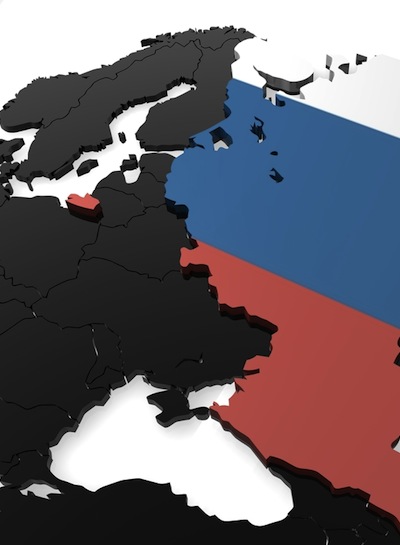Ukraine and the Return of Geopolitics
The long-term Impact of Putin’s war.

Credit: A. Steffen - Shutterstock.com
Takeaways
- With its fragile petro-economy, Russia can only lose a cold war against the West, even if it is only a mild cold war.
- Western businesses will be more reluctant to invest in Russia, depriving it of capital and know-how.
- Russia faces two major strategic threats: the rise of China and Islamic fundamentalism.
- The return of geopolitics will further strengthen the resolve to keep the Eurozone together
After conquering major parts of Ukraine’s Donbass region on top of annexing Crimea at gunpoint, Russian President Putin has now reportedly agreed to a ceasefire. With its military forces routed from the region, Ukraine cannot do much against whatever Putin’s plans are for the region that Russian “volunteers” have invaded.
The experience of Georgia and Moldova suggests that, with the conflict frozen, the occupied region may turn into a Russian-controlled bandit fiefdom.
Even if the conflict can now be frozen, allowing business confidence and economic growth to rebound in core Europe after a few months, the long-term impact of Putin’s war will likely be significant.
■ Western trust in Putin shattered for good
Even without new sanctions, a mild version of the Cold War will likely ensue for a long time. Expect the West to gradually step up and redirect military spending somewhat to counter the Russian threat. We may have to say farewell to parts of the post-1990 peace dividend.
■ Russia is likely to lose in the end
Russia can easily win any hot war against countries such as Ukraine, Georgia or Moldova. But with its fragile petro-economy, it can only lose a cold war against the West, even if it is only a mild cold war.
■ Scaring businesses away
Western businesses will be more reluctant to invest in Russia than before, depriving Russia to some extent of the capital and know-how needed to fully develop its energy resources and to modernize its non-energy economy.
Russia never belonged to any sensible definition of “BRICs.” It looks set to trail most other emerging markets by a significant margin for a long time to come. Oil prices are unlikely to rise and offset Russia’s gradually increasing economic problems. With a likely rise in Russian military spending, Putin will face more and more economic problems and discord at home once the initial nationalist euphoria has petered out.
■ Russia has boxed itself into awkward corner
While snatching parts of Ukraine through a semi-open war, it has probably alienated much of the remainder of Ukraine for generations to come. Except for Belarus, Russia now only has neighbors in the West that are deeply afraid of Russia and are ready to incur some pain in order to stay as clear of Russia as they can. Even Finland and Sweden are now upgrading their cooperation with NATO. Moscow has probably lost Kiev, one of the cradles of Russia’s magnificent civilization, for good.
■ Bad strategy
In the longer term, Russia faces two major strategic threats. First, the rise of a China that may or may not eventually revive ancient claims on parts of Russia’s thinly populated Siberia/Far East. Second, Islamic fundamentalism at its southern rim. By antagonizing Europe, the one region that merely wanted peaceful commerce and cooperation, Russia has weakened its hand versus China a lot. Expect China to drive a very hard bargain as Moscow now tries to turn more towards Beijing.
■ A more coherent West
Democracies discuss, clubs of democracies such as the EU and NATO can bicker a lot. That’s normal. They do take their time, but they do react to challenges. They did win the last cold war; they did put Milosevic behind bars. All the current noisy debates about how to react to the Russian challenge should not obscure one likely consequence: Putin’s war has likely strengthened the internal cohesion of the West.
■ No relapse into euro crisis
The return of geopolitics will further strengthen the resolve to keep the Eurozone together. For example, the consequences of what a hypothetical forced Greek exit from the euro would mean would be discussed in Athens, Berlin and Frankfurt a bit more in geopolitical in addition to merely economic terms. A break-up of the Eurozone has become even less likely. Bond markets have got that one quite right, in our view.
■ A little fiscal leeway
We do not expect any major fiscal stimulus in the Eurozone. As in 2014, Germany may grant itself a little stimulus in 2015, possibly some extra investment spending. But that and some investment-spending initiatives on the European level will likely remain small fry.
More important, in response to the current pause in Eurozone growth and, possibly, to the need to gradually strengthen the military, countries will probably be given more time to meet fiscal targets – especially if they show serious structural reforms.
Paris and Rome, please deliver.



























